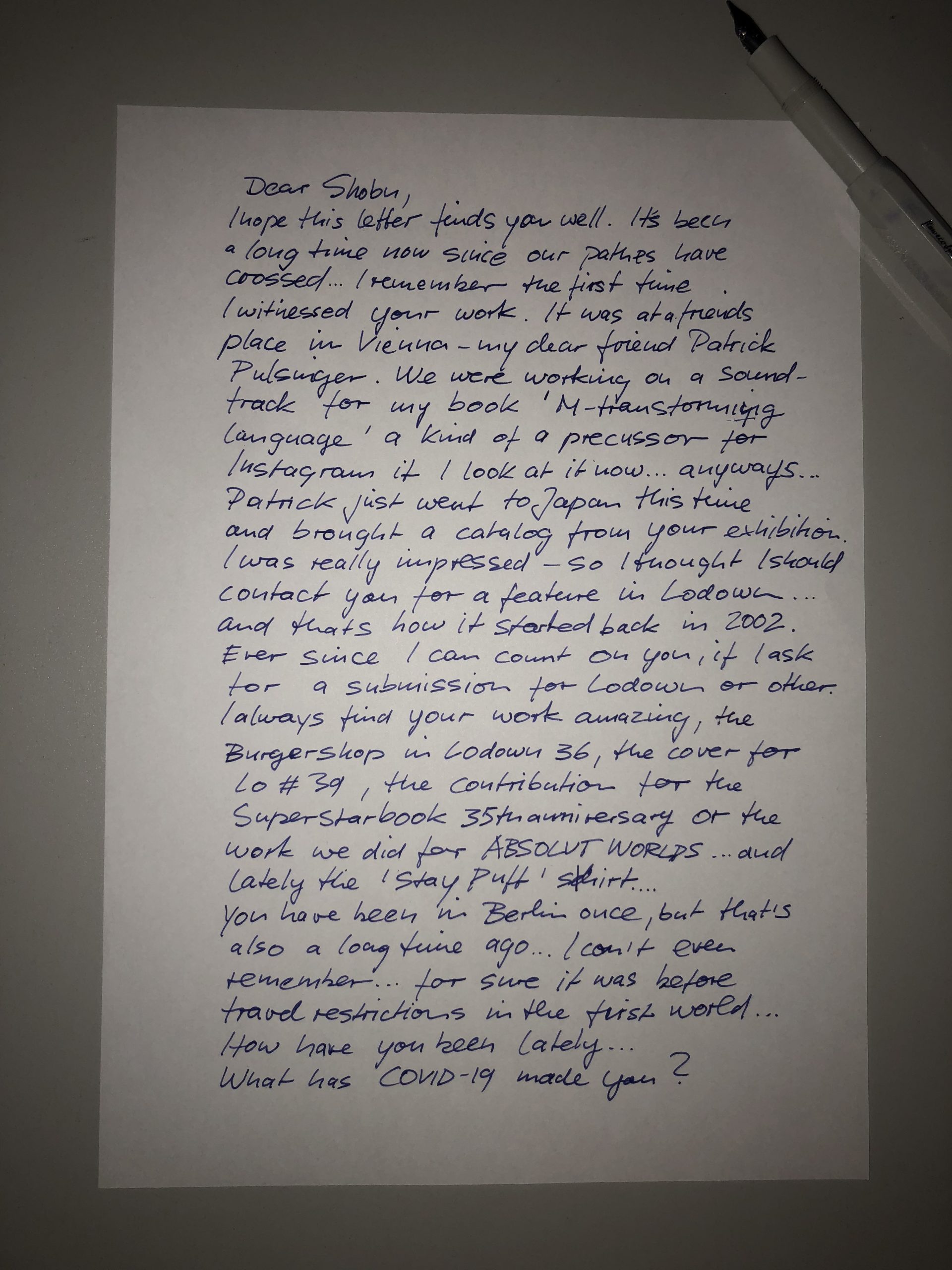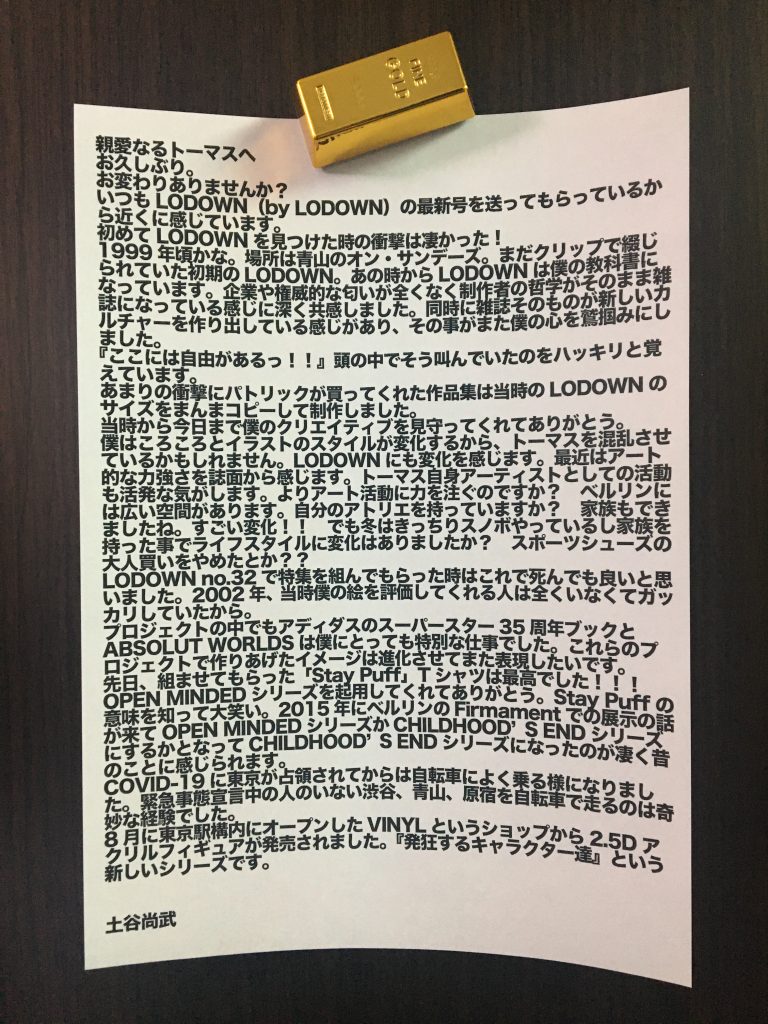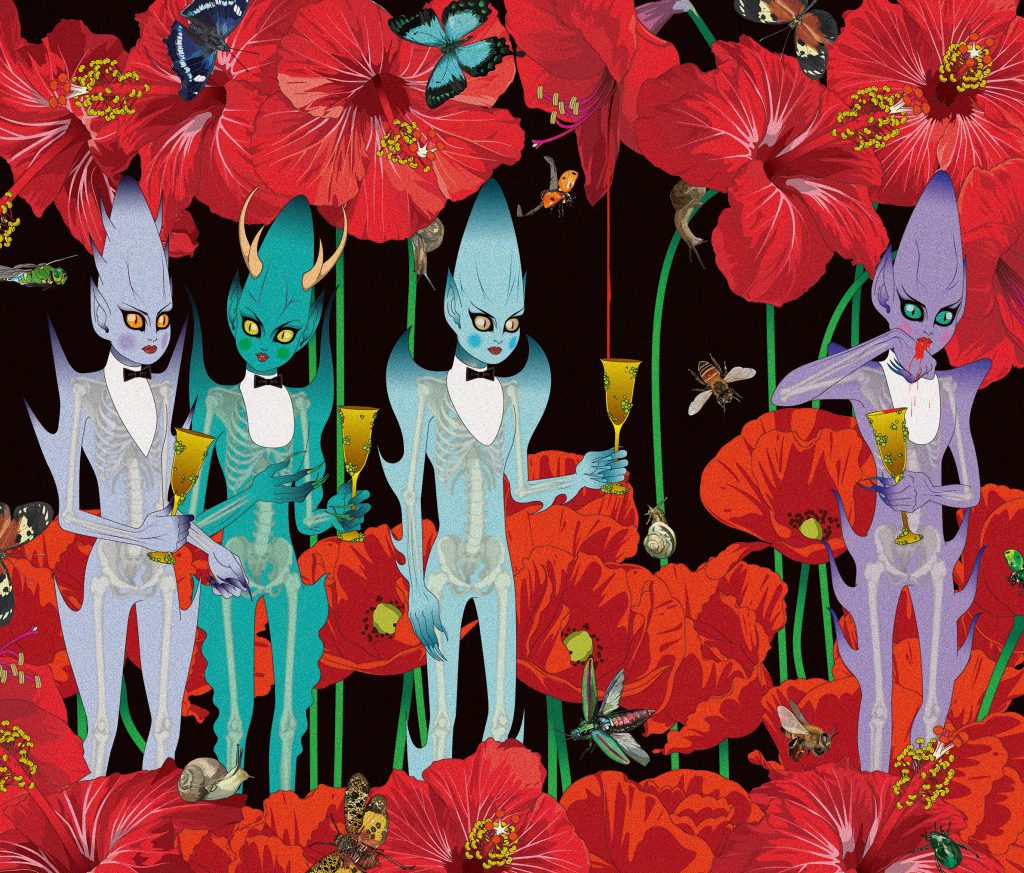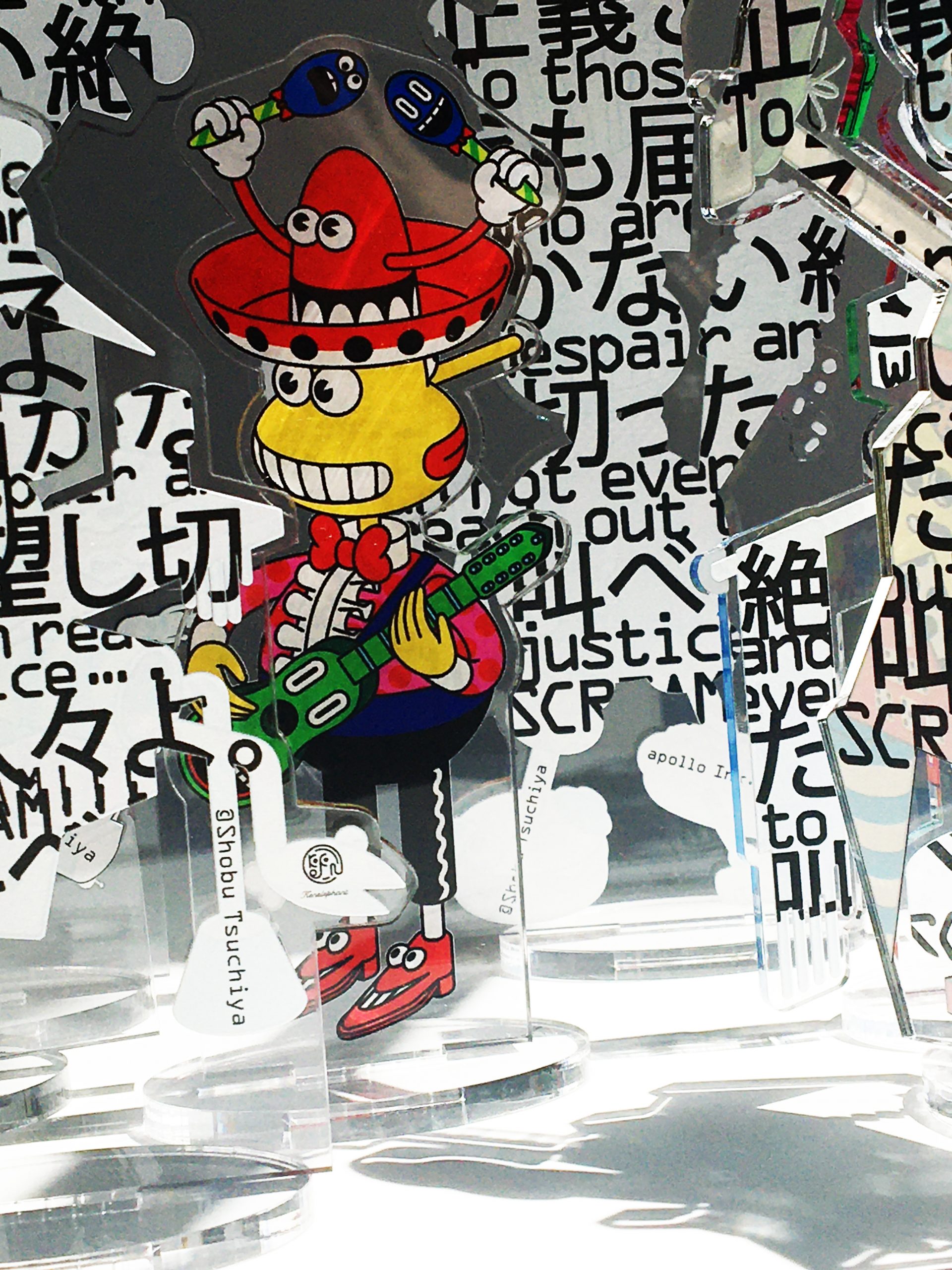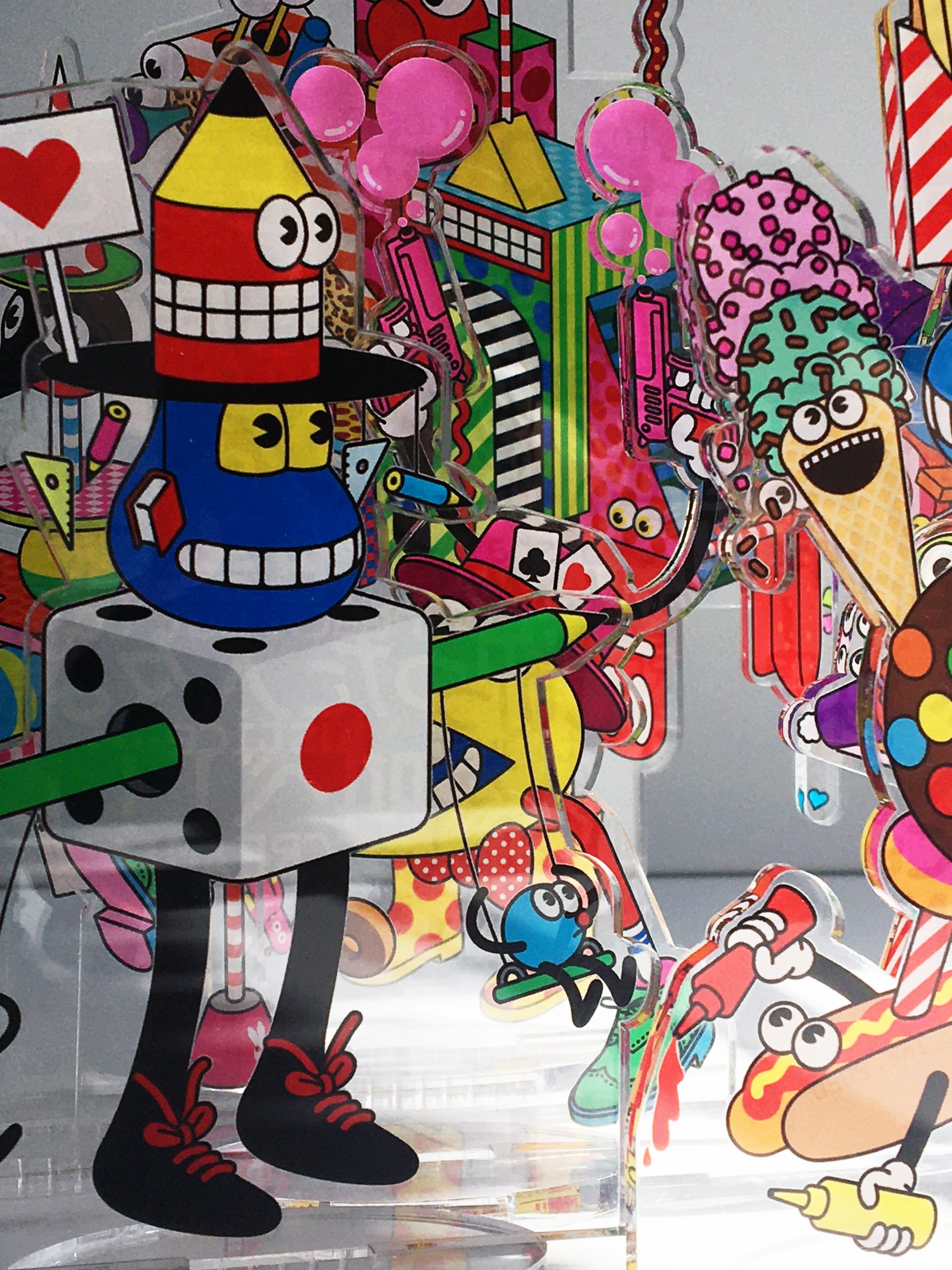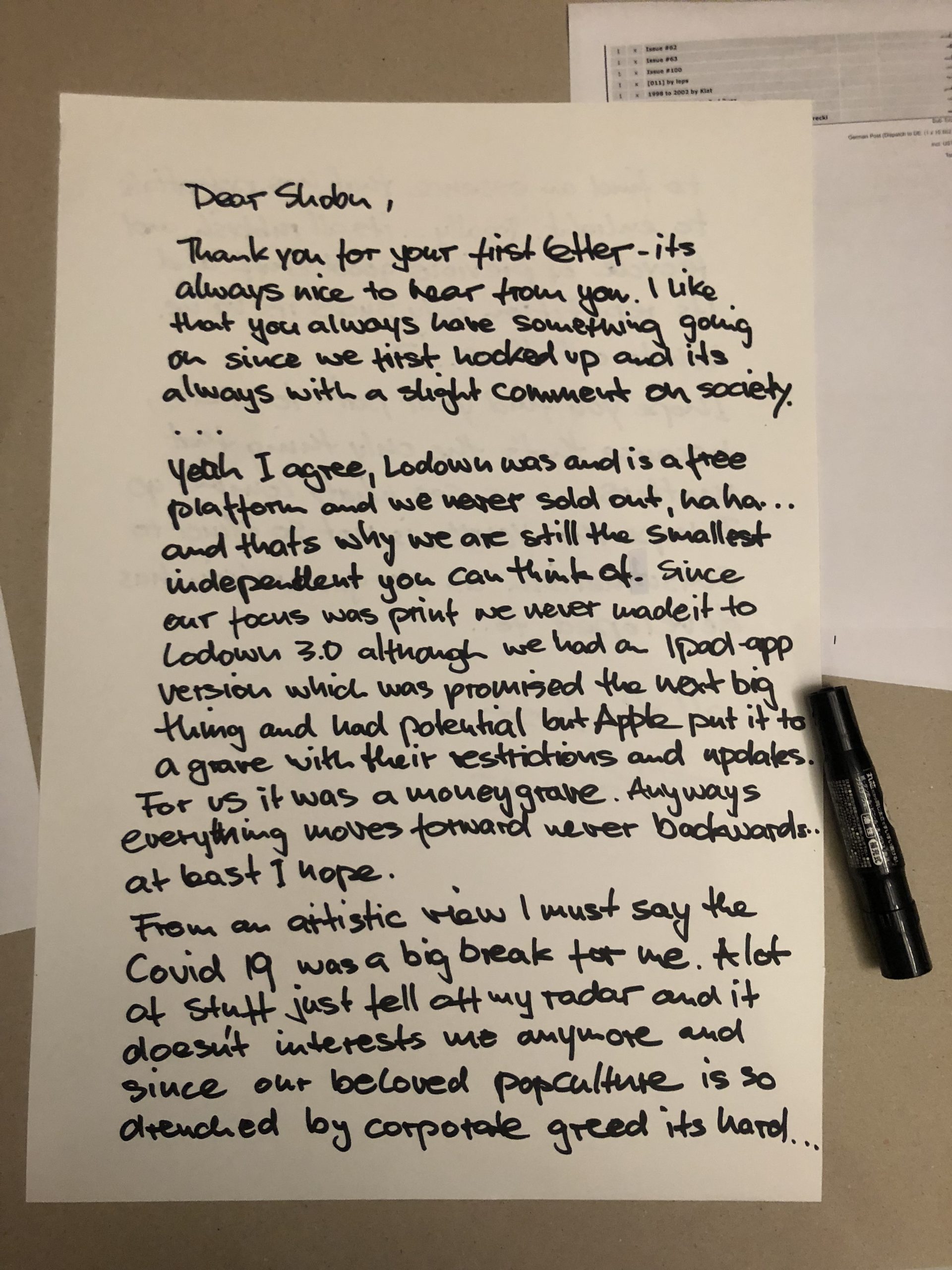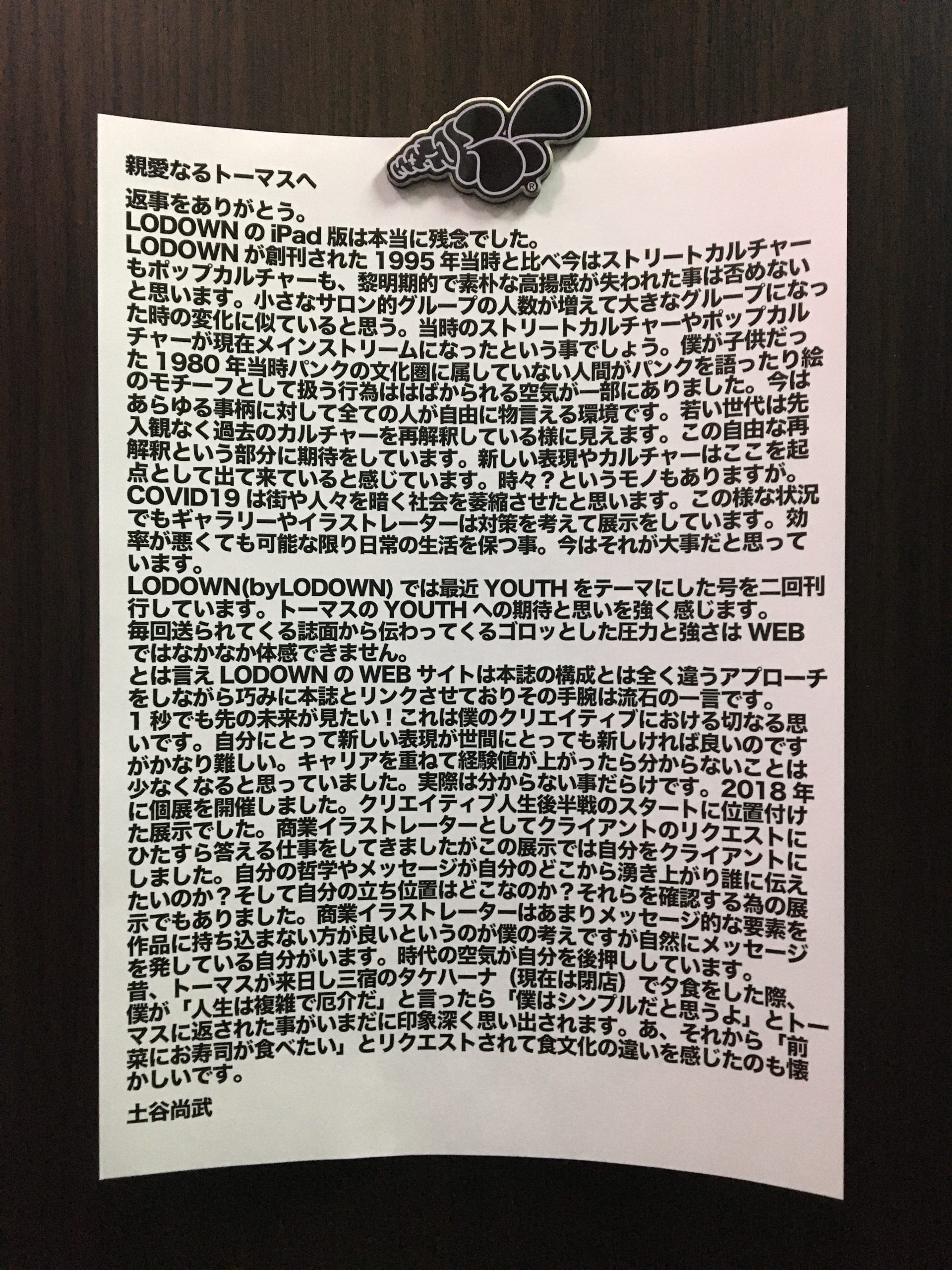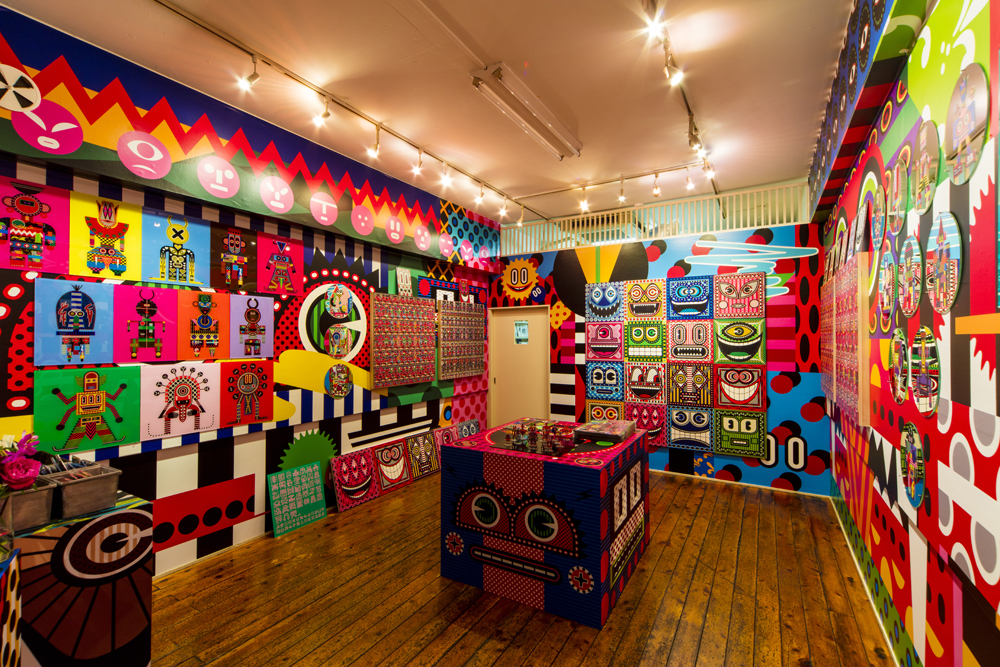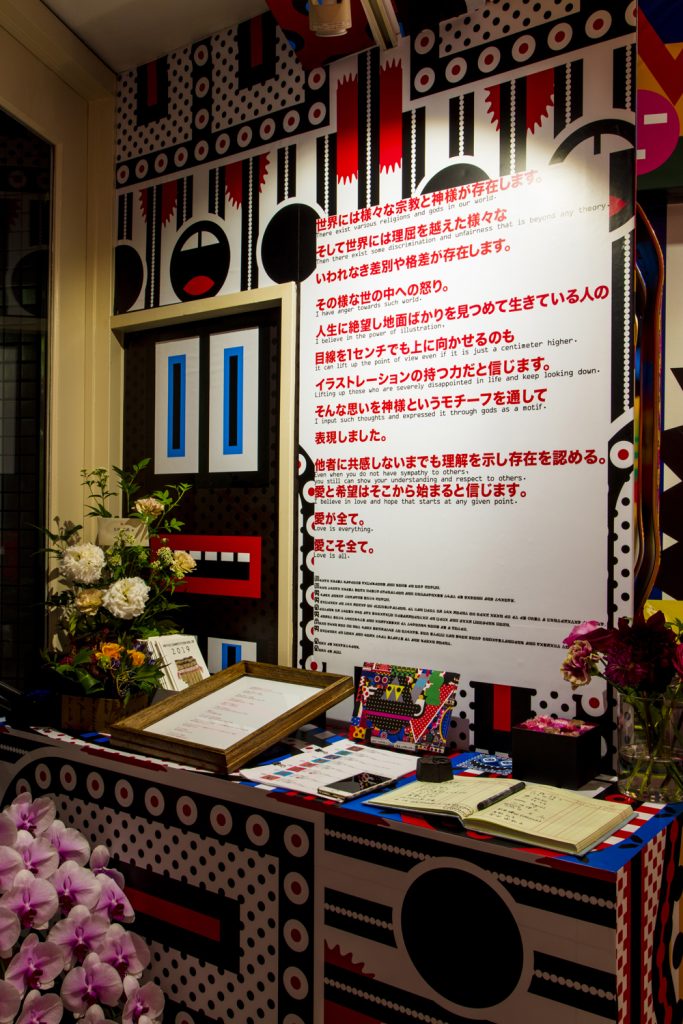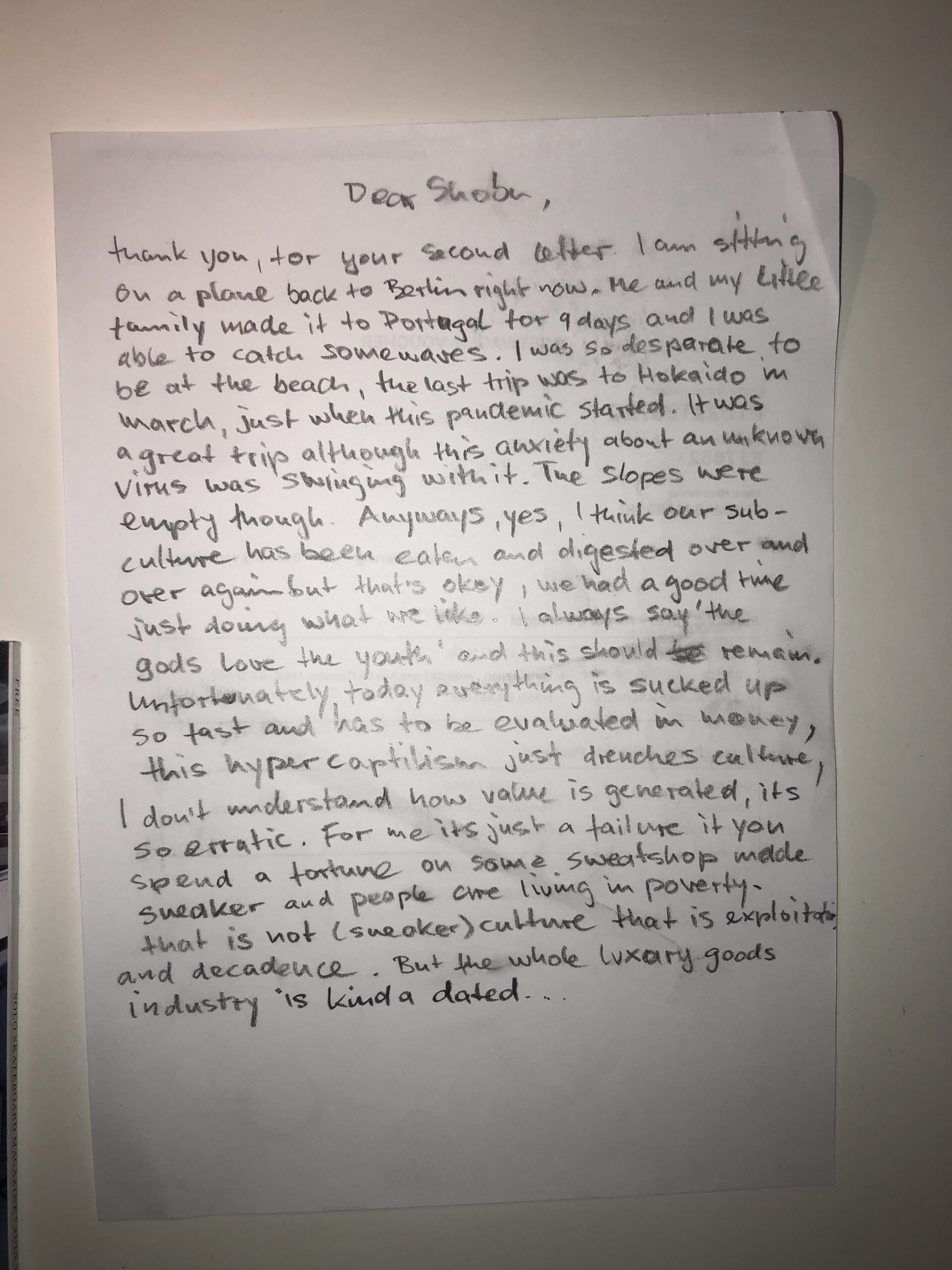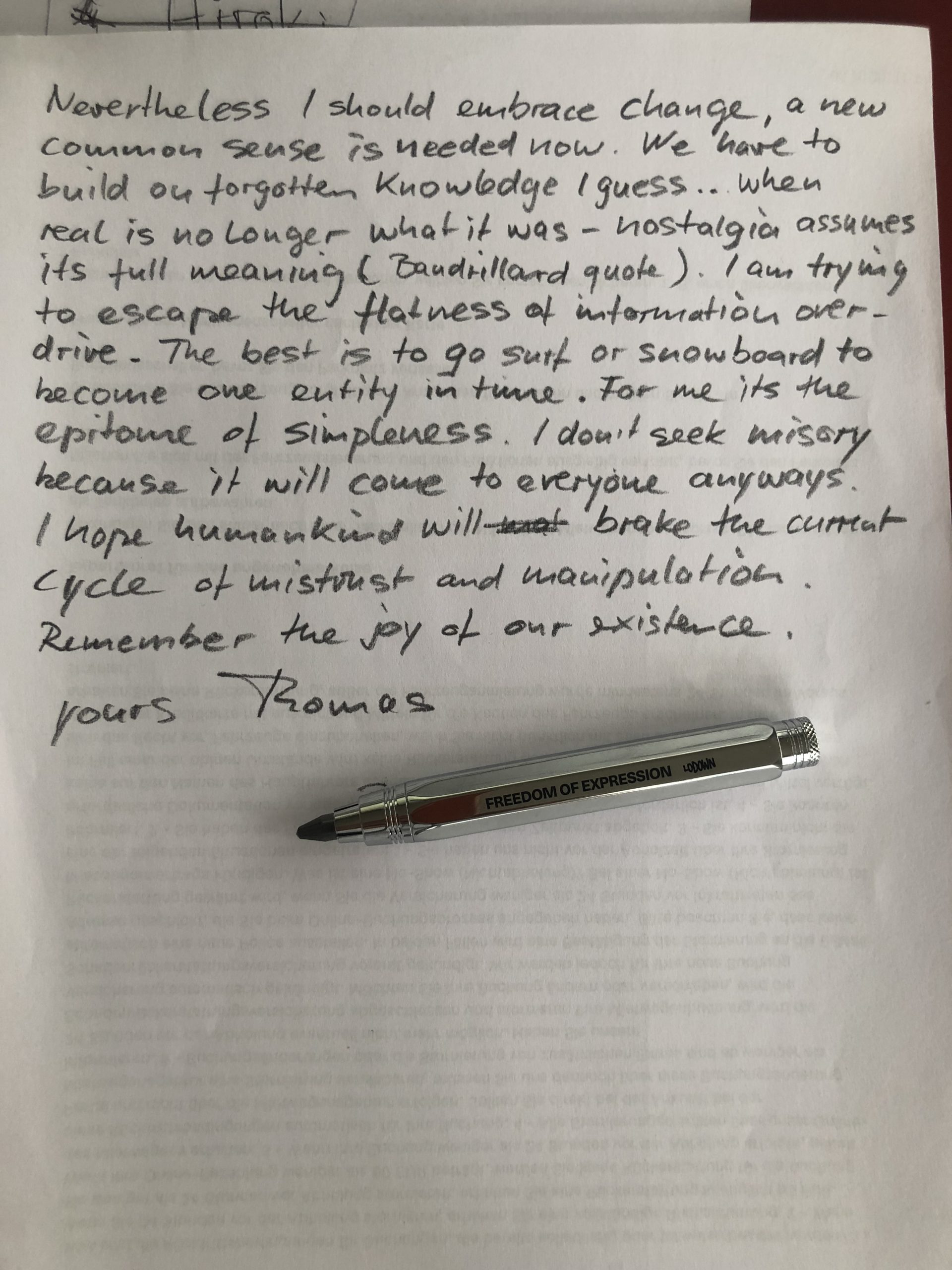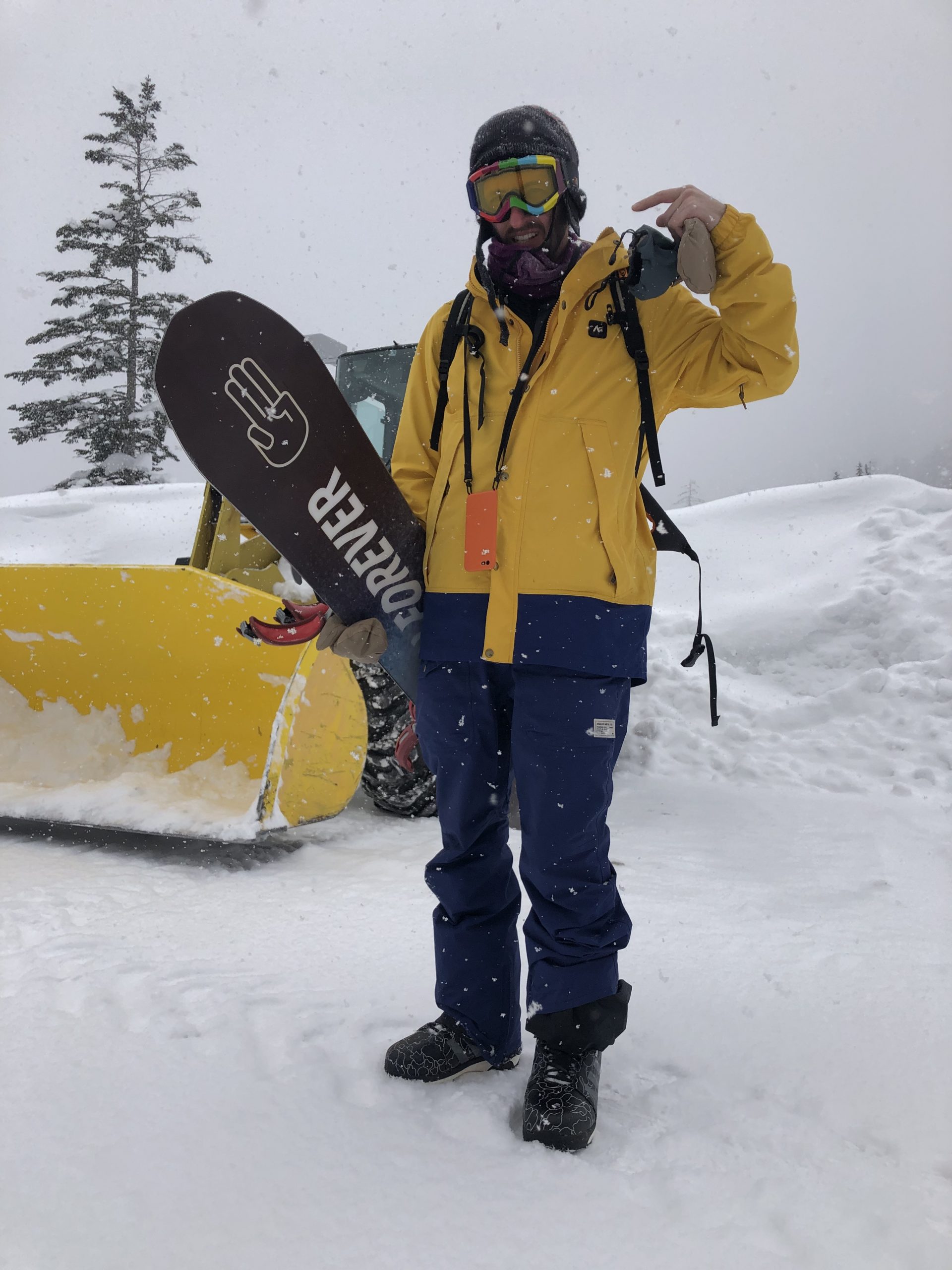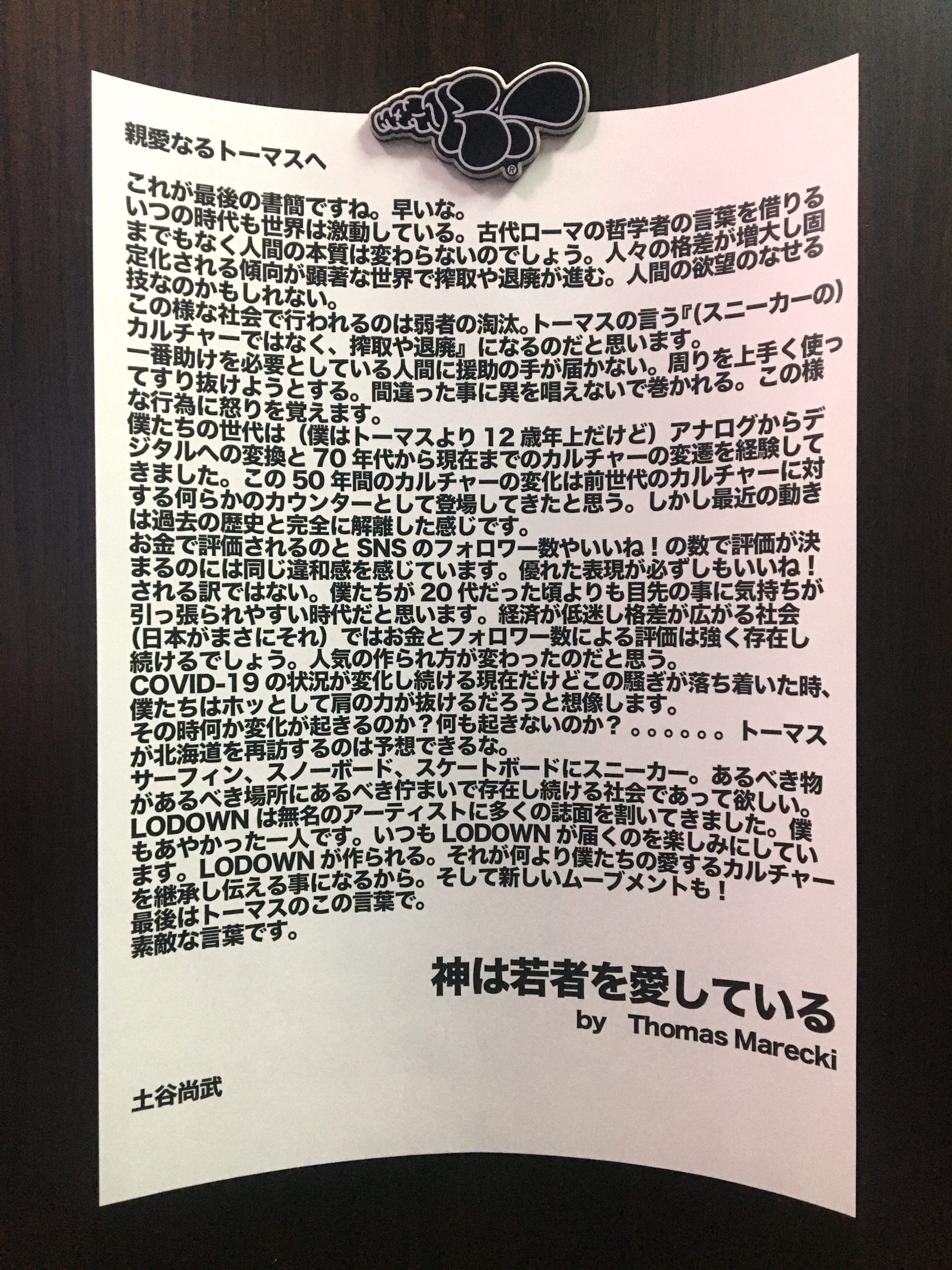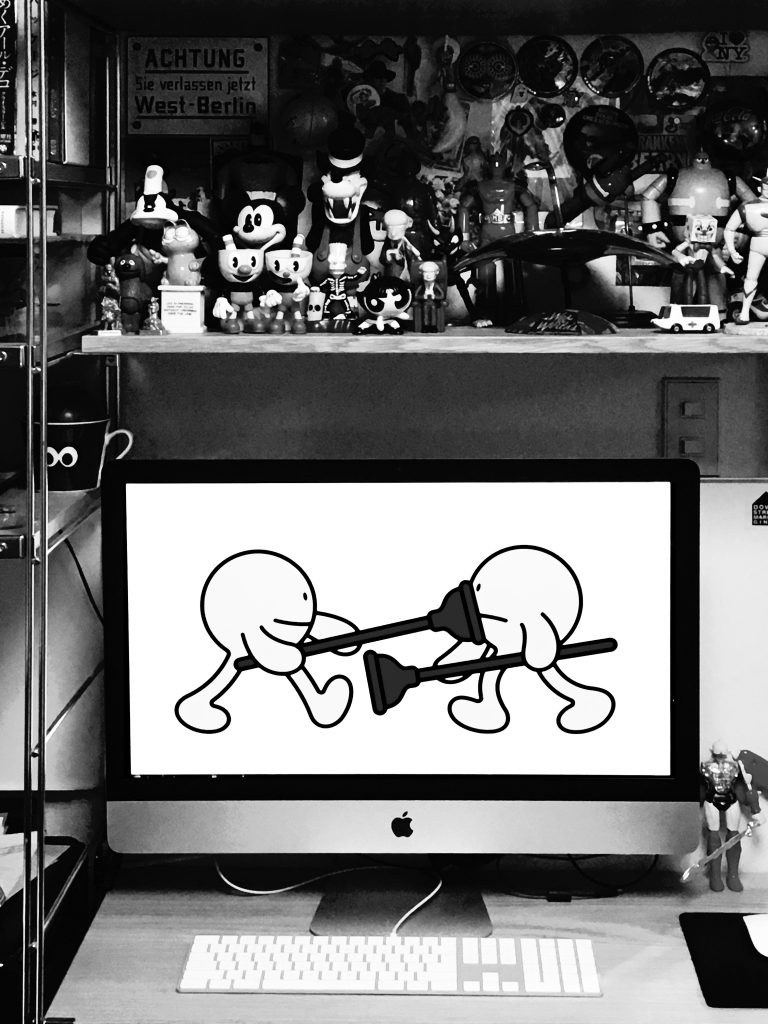First published in 1995, “Lodown Magazine” is a Berlin-based street culture magazine. Founder and creative director Thomas Marecki has always been at the forefront of his beloved culture, from art and music, to board sports and graffiti. For this article, Thomas chose illustrator and longtime friend Shōbu Tsuchiya as his pen pal for this exchange of letters: through “Lodown Magazine,” they have collaborated together on many occasions, and despite their differences in nationality and language, their love for art and culture bonds them together. What can they do to pass down their beloved culture to the next generations? The answer lies in this exchange of letters, once white and empty papers now filled with Thomas and Shōbu’s naked and most candid feelings.
Lodown Magazine connects them.
Dear Shobu,
I hope this letter finds you well. It’s been a long time now since our pathes have crossed… I remember the first time I witnessed your work. It was at a friends place in Vienna – my dear friend Patrick Pulsinger. We were working on a soundtrack for my book ‘M – transforming language’ a kind of a precursor for Instagram it I look at it now… anyways… Patrick just went to Japan this time and brought a catalog from your exhibition. I was really impressed – so I thought I should contact you for a feature in Lodown… and thats how it started back on 2002. Ever since I can count on you, if I ask for a submission for Lodown or other. I always find your work amazing, the Burger shop in Lodown 36, the cover for Lo #39, the contribution for the Superstar book 35th anniversary or the work we did for ABSOLUT WORLDS… and lately the ‘Stay Puff’ shirt…
You have been in Berlin once, but that’s also a long time ago… I can’t ever remember… for sure it was before travel restrictions in the first world… How have you been lately… What has COVID-19 made you?
Dear Thomas,
How have you been?
I get the latest issue of LODOWN sent to me, so I still feel you are nearby.
The first time I saw LODOWN, which was in 1999 as I remember, was amazing!
It was in “On Sundays” in Aoyama. I still have that early LODOWN clipped. Since then, LODOWN has been a textbook for me. There is no sense of corporation or authority and I agree with the editor’s philosophy, which seems to be embodied by the magazine. Also, I felt that the magazine itself was building a new culture which excited me tremendously.
I clearly remember the idea that “freedom is here” echoing around my mind. The collection of works that Patrick bought for me was made by copying the size of LODOWN at the time.
Thank you for watching over my creativity for all this time.
I may have confused you with the changing illustration styles of the time. I also feel LODOWN has changed. Recently, I feel the strength of art from the magazine. You seem to be an active artist. Do you focus a lot on artistic activities? There is a large space in Berlin. Do you have your own Atelier? I see you’ve started a family, too. That is a fantastic development! Can you still go snowboarding in winter, or have you had to change your lifestyle to focus on your family? Do you still have a collection of sports shoes?
I was so happy with my special feature in LODOWN issue 32, that I could have died on the spot. But there was no one to evaluate my painting at that time back in 2002.
I had worked on special projects such as the Adidas Superstar 35th Anniversary Book and ABSOLUTE WORLDS. I want to evolve and express the images I created in these projects.
The “Stay Puff” T-shirt I could include the other day was fantastic!
Thank you for using the OPEN MINDED SERIES. I laughed a lot when I found learned of the meaning of Stay Puff. It seems a lifetime since the exhibition at The Firmament in Berlin in 2015 when the CHILDHOOD’S END series was selected over the OPEN MINDED series.
After Tokyo was captured by COVID-19, I started cycling a lot. It was a strange to ride through the usually bustling areas of Shibuya, Aoyama, and Harajuku, which are now quiet due to the emergency declaration.
In August, 2.5D acrylic figures were put on sale in VINYL, a new store in Tokyo Station. The new series is called “Characters that go mad”.
How to deal with cultural transitions and pandemics
Dear Shobu,
Thanks for your second letter – its always nice to hear from you. I like it that you always have something going on since we first hooked up and its always fresh with a slight comment on society.
Yeah I agree, Lodown was and is a free platform and we never sold out, haha… and thats why we are still the smallest independent you can think of. Since our focus was print we never made it to Lodown 3.0 although we had an Ipad version which was promised the next big thing and had potential but Apple put it to a grave with their restrictions and updates. For us it was a money grave. Anyways everything moves forward never backwards… at least I hope. From an artistic view i must say the COVID19 was a big break for me. A lot of stuff just fell off my radar and it doesn’t interest me anymore and since our beloved pop culture is so drenched by corporate greed its hard to find an essence that has potential to enlight. Really… its all rubbish and recycle of previously good stuff and its repetition only sucks its value. Whats out there…? I hope you find your path to create, because thats the only thing that matters.
Let’s see whats coming up I hope the youth is not so blind to consumerism as our generation has developed to…
Dear Thomas,
Thank you for your reply.
The iPad edition of LODOWN was disappointing.
Compared to LODOWN’s first publication in 1995, I don’t think there is any denying that street culture and pop culture have lost their early, simple fun feeling. This is like the change that happens when a small gathering, as in a salon, increases to become a large group. Both street and pop culture are now mainstream. When I was a child in 1980, there was the ridiculous trend of people appropriating punk culture in artistic motifs and conversation when they weren’t part of that culture themselves. Now the environment is such that everyone can talk freely about anything. It feels as though a new expression or culture is developing from the current situation. I’m excited by this new reinterpretation.
I think the epidemic has darkened the city and people and has atrophied society. Even in such times, galleries and illustrators are putting measures in place to remain open. I think it is important now to maintain our lifestyle at the bare minimum despite the inefficiency.
LODOWN (byLODOWN) has recently published two issues on the youth of today. I strongly feel expectations and ideas for your youth.
The rugged force and strength exuded by the printed copy of the magazine each month cannot be easily experienced on the web.
However, LODOWN’s website is skillfully linked with the magazine even though it takes a completely different approach to the composition.
I want to see into the future, even if it’s only one second! This is how much I want to find my creativity. It would be good if a new expression from me was new for the world, but this is quite difficult. I thought the experience gained throughout my career would increase my knowledge. In fact, the opposite is true. We held a solo exhibition in 2018 that was at the beginning of the second half of my creative life. As a commercial illustrator, I have single-mindedly responded to client requests, but in this exhibition, I became the client. I asked how my philosophy and message was being shown to the world and where I stood amongst it all? The exhibition was to confirm my thoughts. I believe commercial illustrators should not insert too many messages into their work, but I naturally add subtle messages. The current situation is boosting me.
A long time ago, when you came to Japan and we dinner at Takehana, which has since closed down, I said life was complicated and troublesome, but I still remember you replying, “I think it’s simple.” Oh, and I remember getting a sense for the difference in food culture when you asked to eat sushi as an appetizer.
What can we do to pass down our beloved culture to the next generations?
Dear Shobu,
Thank you for your second letter. I am sitting on a plane back to Berlin right now. Me and my little family made it to Portugal for 9 days and I was able to catch some waves. I was so desperate to be at the beach, the last trip was to Hokkaido in March, just when this pandemic started. It was a great trip although this anxiety about an unknown virus was swinging with it. The slopes were empty though. Anyways, yes, I think out subculture has been eaten and digested over and over again but that’s okey, we had a good time just doing what we like. I always say the gods love the youth and this should remain.
Unfortunately, today everything is sucked up so fast and has to be evaluated in money, this hyper capitalism just drenches culture, I don’t understand how value is generated, its so erratic. For me its just a failure if you spend a fortune on some sweatshop made sneaker and people are living in poverty.
That is not (sneaker) culture that is exploitation and decadence. But the whole luxury goods industry is kind a dated…
Nevertheless I should embrace change, a new common sense is needed now. We have to build on forgotten knowledge I guess… when real is no longer what it was – nostalgia assumes its full meaning (Baudrillard quote). I am trying to escape the flatness of information overdrive. The best is to go surf or snowboard to become one entity in time. For me its the epitome of simpleness. I don’t seek misery because it will come to everyone anyways.
I hope humankind will brake the current cycle of mistrust and manipulation.
Remember the joy of our existence.
Dear Thomas,
This is the last letter of our correspondence; it went on so fast.
Every generation gets to experience a turbulent world. I shouldn’t need to borrow the words from the philosophers of Ancient Rome, but I guess it’s true that human nature never changes. With the tendency to continually increase its wealth disparity and inequality between people, our world is facing more exploitation and decadence. It may just be the result of humanity’s lust.
What is taking place in our society right now is the selection and elimination of the weak; I think you’re right by saying that “it’s not about (sneaker) culture anymore, just exploitation and decadence.”
The people who need help the most are out of reach. Some people can trick the system by making use of their surroundings, and some people don’t stand up in front of injustice, thus repeating the cycle; I feel anger toward such behaviors.
Our generation (although I am 12 years older than you) has experienced the conversion from analog to digital and the cultural transition from the 70s to the present. I see the cultural changes of the last 50 years as a counteraction to the previous generation. However, recent happenings seem to be completely dissociated from the rest of history.
I feel the same sense of discomfort when I see people deciding your worth by how much money you make, and when they do so by looking at your amount of followers and likes on social media. Not every exceptional form of expression gets likes. I think this is an era when we are more likely to be drawn to what’s right in front of our eyes, rather than when we were in our twenties. In a society where the economy is sluggish, and inequality is spreading (Japan is an accurate example,) this concept of evaluating people based on money or their number of followers will stubbornly continue to be present in our lives. I think the way popularity is made has changed.
Even though the situation with COVID-19 is ever-changing, I imagine that when it’ll all calm down, we will take a sigh of relief and start unpacking our stress.
When that happens, will something change? Or will nothing change…? I can definitely tell that you’ll be visiting Hokkaidō again.Surfing, snowboarding, skateboarding and sneakers: I want a society where everything is as it should be.
Lodown has devoted many pages to unrecognized artists. I was one of them too. I am always looking forward to a new issue. As long as Lodown gets created and published, we can propagate and pass down our beloved culture to the next generations, thus creating a new movement!
I’ll end this letter with your own words.
They are wonderful words.
The gods love the youth
by Thomas Marecki
Thomas Marecki
Born in Berlin, 1972. Thomas is the founder and creative director of “Lodown Magazine.” He is active as a graphic designer under the alias of Marok. He founded the street culture magazine “Lodown Magazine.” Its regular publication ended with the 100th issue, in 2016. Nowadays, the magazine is only published for specific thematics, such as youth culture.
www.lodownmagazine.com
www.instagram.com/marok_tm/
www.instagram.com/lodownmag/
Shōbu Tsuchiya
Born in Buenos Aires, 1963, Shōbu is an illustrator. In 1996, he won the first prize of the yearly award “The Choice.” He works as an ad illustrator for different entities, such as Mori Building, Uniqlo, Kirin Hard Cidre, etcetera. He also presides over Apollo inc., which he founded with Makiko Umeki. Shōbu has been collaborating with “Lodown Magazine” since 2002; together, they released the t-shirt “Stay Puff” in 2020.
www.instagram.com/shobutsuchiya/

